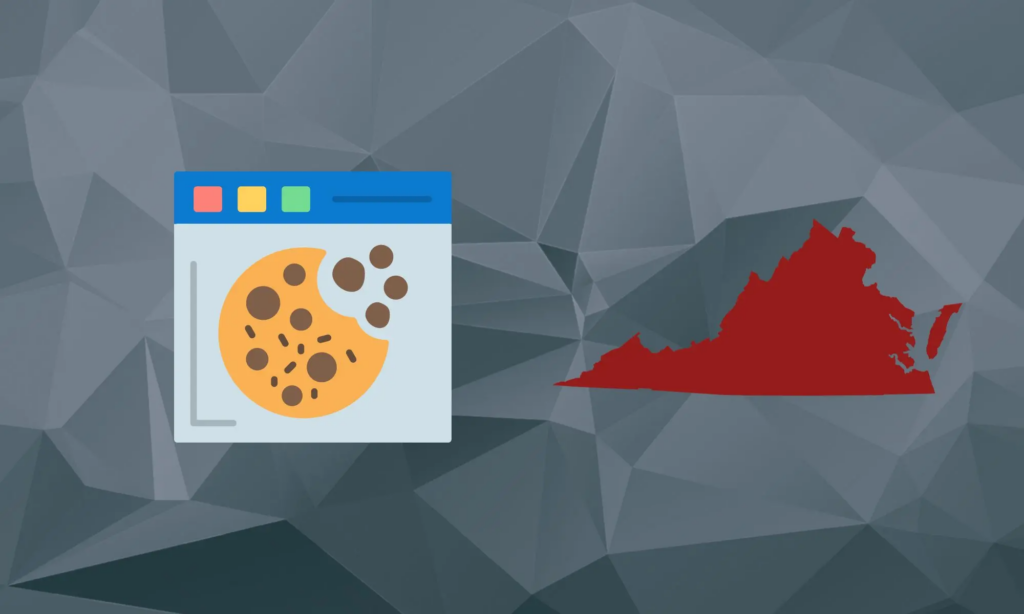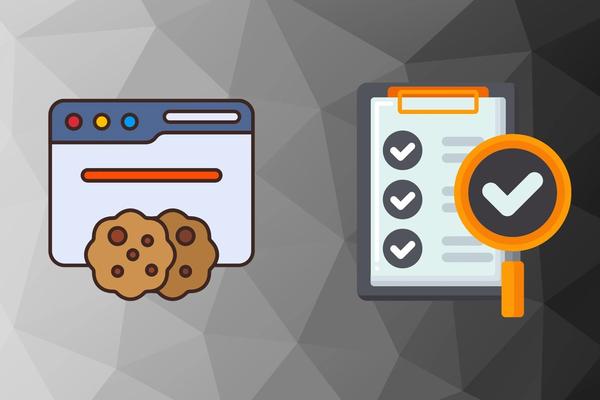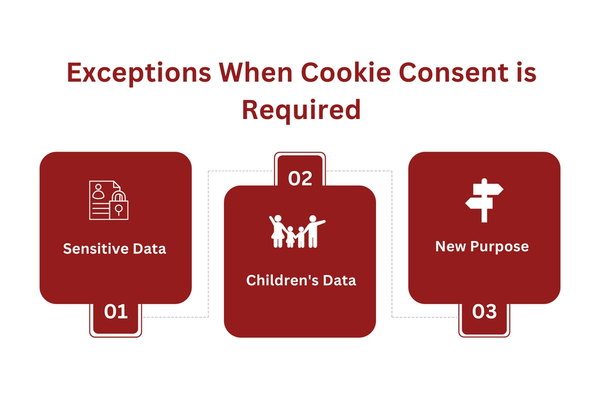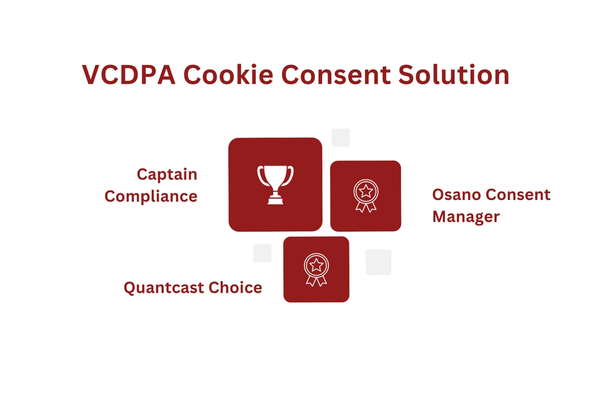
Do you know about VCDPA cookie consent solutions? They could be the difference between large fines and compliance for your business. Today, it’s key for businesses to follow data protection laws. The VCDPA is a big law. It changes how businesses use personal information and cookies online.
This article talks about VCDPA cookie consent solutions. We will look at what they are, why they are important, and how they change your business. This is useful for all businesses, big or small. We will make it easy to understand data privacy and VCDPA rules.
Let’s learn about VCDPA cookie consent solutions together!
Key Takeaways
The Virginia Consumer Data Protection Act (VCDPA) affects any business handling Virginians’ data, emphasizing consumer choice in data use and requiring specific consent for sensitive information.
Under VCDPA, businesses can use cookies by default but must allow consumers to opt out, with opt-in consent needed for sensitive data, children’s information, and new data uses.
Not following VCDPA rules can lead to hefty fines of up to $7,500 per violation, highlighting the importance of compliance for businesses of all sizes.
What is the VCDPA?
The Virginia Consumer Data Protection Act (VCDPA) is a big new law about keeping personal information safe. It started on January 1, 2023. It affects businesses in Virginia and those that sell things to people in Virginia. This law is for all businesses, even if they’re not in Virginia, that use the personal data of their citizens.
If your business has personal data of over 100,000 Virginians or data of 25,000 people and you make 50% of your revenue from selling this data, you are required to follow this law.
The VCDPA lets residents in Virginia choose if they want their personal data collected, used, or sold. Usually, businesses can collect basic personal data without asking (aka opt-in consent). But people can always request to opt out of data collection or delete the data.
For VCDPA sensitive data, such as social security numbers or citizenship status, businesses are required to seek consent first, otherwise known as collect opt-in consent.
The Virginia Attorney General makes sure businesses follow the VCDPA. If they don’t, they could be fined up to $7,500 for each violation of the law. However, they do provide a 30-day cure period to allow you to correct your mistake without getting fined.
Businesses must clearly inform individuals about their data subject rights, detailing what data is collected, why, and whether it is shared. They also have to protect this data well. People in Virginia have specific VCDPA rights, allowing them to see their data, change it, delete it, or opt out of it being used for ads.
The VCDPA, including its VCDPA amendments, is a big step for data privacy in the U.S., similar to privacy laws like the CCPA and GDPR but with unique aspects. It shows more states are making strict data privacy laws. This highlights how important it is to protect data today.
What is VCDPA Cookie Consent
What is VCDPA Cookie Consent.jpg

The Virginia Consumer Data Protection Act (VCDPA) has set new rules for how businesses handle personal data, including the use of cookies on websites for certain cases. This is important for any business operating in Virginia or dealing with Virginia residents.
Under the VCDPA, businesses can use cookies without asking for permission first in most cases. However, they must not collect their data if the consumers request their information not to be processed. This is called the ‘opt-out’ approach. However, there are three special cases where businesses must get clear permission (consent) first:
When dealing with very personal data (like SSNs or citizenship status).
When collecting data from children (under 13).
When using data for reasons different from those originally collected.
Consent must be clear and specific for these cases. This means people should know exactly what they’re agreeing to. For example, if a website wants to use cookies for tracking exact locations, it should ask consumers directly and clearly.
If a business needs to get consent, it should be done in a way that’s easy to understand. This might be a cookie consent banner on a website that explicitly asks consumers if they agree to cookies for specific purposes. The key is to make sure people know what they’re agreeing to and that they have a real choice.
Following these rules is crucial. If a business doesn’t get consent right, it could face big fines. Plus, it’s best practice to respect people’s choices about their personal data. Getting cookie consent right under the VCDPA shows that a business cares about its consumers’ privacy.
Does The VCDPA Require Cookie Consent?
The Virginia Consumer Data Protection Act (VCDPA) sets rules for how businesses handle personal data. It’s important for businesses in Virginia or those serving Virginia residents. The VCDPA mostly uses an “opt-out” approach.
This means businesses can use cookies unless a person says they don’t want their data used. But, there are three big exceptions where businesses must get clear permission (consent) from people:
Sensitive Personal Information: This includes details like race, religion, health, sexual orientation, genetic data, and exact location. Businesses must ask for clear consent before using cookies to gather this kind of information.
Children’s Personal Information: If a business knows it’s collecting data from kids under 13, it needs to get consent from a parent or guardian.
New Purposes: If a business wants to use personal data for something different than what it was originally collected for, it must get consent again. For example, using data collected for a service to then show targeted ads.
Exceptions and Specific Actions
Exceptions When Cookie Consent is Required.png

In the world of data privacy, understanding the nuances of consent is key, especially under the Virginia Consumer Data Protection Act (VCDPA). While the VCDPA generally follows an opt-out model for cookie consent, it’s crucial to note the exceptions. These exceptions, which require explicit consent, apply to sensitive personal information, children’s data, and data used for new purposes.
Let’s delve into what these exceptions entail and the specific actions businesses must take to comply.
Sensitive Data Examples and Actions
Government Identifiers: These include tax numbers, EINs, identification cards, and things of that nature.
Racial or Ethnic Origin: If a website collects this for a survey, it needs clear consent.
Religious Beliefs: For example, a site gathering this for a religious community must ask for consent.
Health Diagnosis: Health apps collecting this data need explicit permission.
Sexual Orientation: Sites or apps that gather this for dating or social purposes must get consent.
Genetic Data: If used for identifying a person, like in ancestry services, consent is needed.
Biometric Data: Used in security systems, this requires clear consent.
Children’s Data: Educational apps for kids under 13 must get parental consent.
Specific Geolocation Data: Apps tracking the exact location of services or ads need to ask for permission.
Children’s Data
Age Limit: Applies to kids under 13.
Parental Consent: Must be obtained for collecting children’s data, following strict guidelines, like verifying government-issued IDs of the parents or having a consent form filled out by the parents.
New Purpose
Example: Using financial data, initially collected for a service, now for targeted ads.
Action Required: Get new consent for the use of this data for the new purpose.
Businesses must be clear and upfront in their privacy notices about these practices and give people easy ways to say no to data collection. If they don’t follow these rules, they could face big fines.
VCDPA Cookie Consent Solution
VCDPA Cookie Consent Solution.png

The Virginia Consumer Data Protection Act (VCDPA) brings unique challenges, particularly around cookie consent. To address these, a variety of cookie consent solutions have emerged, each offering different features and levels of support for VCDPA compliance.
Captain Compliance
Captain Compliance is a standout choice for VCDPA cookie consent management. Tailored specifically for the VCDPA, it simplifies the process of managing cookie consents, ensuring businesses adhere to the act’s requirements.
It’s particularly adept at handling the act’s opt-out consent model and the necessary exceptions for opt-in consent.
Osano Consent Manager
Osano Consent Manager is a versatile tool that caters to various data protection laws, including the VCDPA. It’s a good fit for businesses looking for a comprehensive solution that covers multiple regulations.
Quantcast Choice
Quantcast Choice offers a free yet effective consent management platform. While it’s more focused on GDPR and CCPA, it can be adapted for VCDPA compliance, especially for businesses on a tight budget.
Piwik Pro Consent Manager
Part of a broader analytics platform, Piwik Pro Consent Manager is ideal for businesses that need to combine consent management with detailed consumer behavior insights.
CookieYes
CookieYes is a user-friendly and affordable option, particularly suited for small to medium-sized businesses. It integrates easily with various content management systems.
Cookiebot
Cookiebot is known for its multilingual capabilities, making it a great choice for businesses with an international audience. It offers robust consent management features.
TrustArc Cookie Consent Manager
TrustArc provides a solution that adapts to different regional privacy laws, ideal for businesses operating in multiple jurisdictions. It’s a comprehensive choice for broader compliance needs.
VCDPA Sensitive Data Additional Requirements
The Virginia Consumer Data Protection Act (VCDPA) has clear rules for dealing with sensitive data. Businesses need to have a way to handle requests from people who want to see or change their personal information.
They also need to keep track of when people agree to share their data. Plus, they should check how they use this data to make sure it’s safe and fair. These steps are important for businesses to follow the law and look after the rights of their consumers.
Responding to DSARs
Under the VCDPA, consumers have the right to access, correct, delete, or obtain a copy of their personal data. Businesses must establish efficient methods to handle these requests. This means having a clear process for consumers to submit their requests and a system for the business to respond promptly and accurately.
Record Keeping for Consent
When it comes to sensitive data, explicit consent is required. Businesses must not only obtain this consent but also keep detailed records of it. This includes documenting when and how consent was given and what exactly the consumer consented to.
This record-keeping is vital for compliance and for responding to any inquiries from the authorities or the consumers themselves.
Data Protection Assessments
Businesses must conduct Data Protection Assessments for activities involving sensitive data. These assessments help identify and mitigate risks associated with data processing activities. They should evaluate the necessity and proportionality of processing sensitive data and consider the risks to consumer rights and freedoms.
VCDPA Fines & Penalties for Non-Compliance
If a business doesn’t follow the rules, there can be big fines. Here’s what you need to know:
If a business doesn’t do what the VCDPA requires, it can be fined up to $7,500 for each time it breaks the rules. This means if a business makes the same mistake many times, the total fine can be really high.
However, before a business has to pay a fine, it gets a warning. This warning, called a right to cure, which is a 30-day notice of violation that gives the business a chance to fix its mistakes. If the business fixes everything in 30 days, it might not have to pay the fine.
But this isn’t just about the fines; it is not just about paying money. The VCDPA also wants businesses to be careful with personal information. It’s also about making sure they do better in the future.
Plus, non-compliance with the VCDPA could lead to a bad reputation, which could mean your customers switch to your compliant competitors.
Closing
As you wrap up learning about the VCDPA, you might be thinking about what to do next for your business**. This is where Captain Compliance steps in to help. We understand that navigating data privacy laws can be complex, but with our guidance, you can ensure your business is compliant without the stress.**
Our compliance services are tailored to meet your unique needs, from managing cookie consent and handling sensitive data to responding to data subject requests. Reach out to us, and let’s work together to secure your business’s data practices. With Captain Compliance, you’re achieving corporate compliance while also building trust with your consumers.
So take that next step towards a compliant and confident future for your business. Get in touch with us today.
FAQs
What is the VCDPA, and who does it apply to?
The VCDPA, or Virginia Consumer Data Protection Act, is a law that aims to protect personal information. It applies to businesses in Virginia and those outside Virginia that collect data from Virginia residents. If your business has data from over 100,000 Virginians or 25,000 people, if over 50% of the revenue comes from selling this data, you must follow the VCDPA.
Need to know if your business falls under the VCDPA? Read our detailed guide here for clarity!
How Does VCDPA Affect Cookie Consent on Websites?
Under the VCDPA, businesses can use cookies by default but must let consumers opt-out. Special permission is needed for sensitive data, children’s data, and using data for new purposes.
Confused about cookie consent under VCDPA? Discover more about managing it effectively with our resources at Captain Compliance. Visit our education section for detailed insights and guidance!
What Are the Penalties for Not Complying with VCDPA?
Not following VCDPA can lead to fines of up to $7,500 per violation. Businesses get a 30-day notice to fix issues before fines are imposed. Non-compliance can also mean making changes to how you handle data.
Worried about facing penalties under the VCDPA? Don’t navigate these complex regulations alone. Contact us today and ensure your business stays compliant and fine-free!
What Steps Should Businesses Take to Comply with VCDPA?
Businesses should understand the data they collect, get consent where needed, especially for sensitive data, and have clear policies for consumers to opt out. They should also be ready to respond to consumer requests about their data.